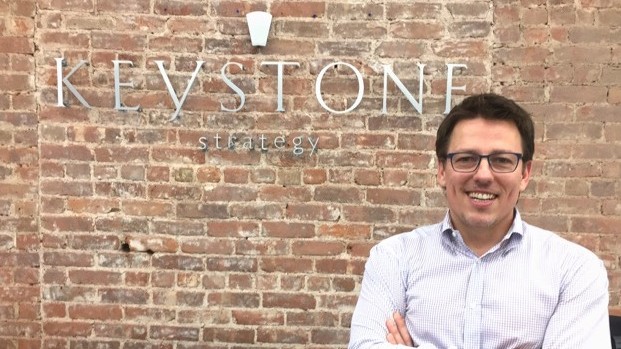
Get Paid to Share Your Expertise
Help shape the future of business through market research studies.
See Research StudiesGreg Richards and Marco Iansiti co-founded Keystone Strategy in 2002 to fill a gap in tech industry consulting.
Richards, a former robotics engineer and software product developer with Silicon Valley start-ups, and Iansiti, his former Harvard Business School professor and advisor, saw the business opportunity, but also wanted to build a different kind of consulting firm.
Richards and Iansiti felt management consulting and economic consulting firms were underserving the tech industry, even as technology was on the cutting edge of business strategy and business model decision-making. According to Richards, “We felt it was fertile ground to bring a new set of skills to solve these problems. The basic idea was that we would need software engineering talent, econometricians who could manipulate data and draw insight from information in large scale, and traditional MBAs with business experience, business intuition and managerial skills. Combining these skill-sets presented a unique juxtaposition of talent that was not common at that time.”
Today, Keystone is a strategy, data analytics and economic consulting firm with about 80 employees and offices in Boston, New York, San Francisco and Seattle. The firm also has a network of over 20 experts, including professors from leading business schools – Harvard, Stanford, MIT Sloan, Wharton, the University of Chicago – and experts in intellectual property, economics, Internet businesses and technological innovation, among others. Expert Susan Athey, Professor of Economics at Stanford Graduate School of Business, is one of the world’s most renowned economists on Internet marketplace design, Bitcoin and digital currency. Co-founder Iansiti, head of Harvard’s Technology and Operations Management Group and chair of Harvard’s Digital Initiative, is an expert himself, brought in on some of Keystone’s most challenging projects.
Keystone’s client list reads like the Who’s Who of technology firms, including Facebook, Microsoft, Amazon, LinkedIn, Nike, GE, Intel, Zillow, Expedia, and Getty Images. “The one universal theme we tend to focus on with clients, whether it be economics or strategy, is that our work almost always includes growth-based consulting, involving customer-facing and competition-oriented problems, and it almost always involves use of a significant amount of data to make decisions,” says Richards.
Strengths in Digital Transformation
Keystone helps companies identify opportunities and implement strategies for digitally transforming their businesses. The theme of digital transformation, which started in the technology industry 10-15 years ago, has spilled across industries and is being adopted by large and small companies. Keystone has been at the forefront of helping many of these companies adopt and adapt to this transformation.
About 50-60% of Keystone’s business is with big technology firms. The rest involves working with companies across industries as they look for ways to transform their customer-facing and growth-oriented functions — such as product development, sales, marketing and partnerships — using new technology and data strategies. According to Richards, these areas “now demand a much stronger understanding and new ways to take advantage of real-time data. What used to be just insight and estimations is now data becoming the raw material you need to know how to manipulate and apply to nearly every aspect of business. It is now a core competency of a company to turn raw data into significantly improved performance and success.”
As an example, technology has transformed the consumer buying process and traditional shelf space optimization models. As Richards notes, “A traditional retail management consultant might come in and look at shelf space optimization on a quarterly basis, store by store, and decide how to position and place consumer packaged goods brands next to one another on the shelf, and maybe apply a lot of analytical rigor. But it’s an overhaul type of mindset to the shelf. Whereas today, in an online environment like Amazon’s, you just expect that merchandising and recommendations are determined in real-time and are highly personalized to your own purchase history and experience, along with other customers’ buying history and experience for similar products. You expect the site to tailor and tune and improve its performance for you, with recommendations, and information on ‘people who bought this also bought that.’ This didn’t exist 13 years ago. The tech industry pioneered this capability, and data is driving this level of analytics across nearly every industry.”
“Another example of digital transformation outside the tech sector is in farming, where there is a significant amount of equipment used in fertilizing and delivering pesticides to large swaths of land with rather inefficient delivery. It’s now commonplace to incorporate camera systems and drones to provide feedback to John Deere tractors, which tune the delivery acre by acre. This gives better utilization of fertilizers and much better delivery to the crop. You wouldn’t think of farming as being the type of industry to have broadband access to feedback information that can be analyzed with imaging or other sampling, but they do, and it leads to far better performance and productivity gains. The use of drones and cameras in this industrial capacity isn’t something you would have thought of happening 10-15 years ago.”
Iansiti and another Keystone Expert Karim R. Lakhani, outlined the impact of digital transformation in a recent HBR article titled Digital Ubiquity: How Connections, Sensors and Data are Revolutionizing Business. As Richards summarizes, “GE is instrumenting jet engines and powering turbines to provide feedback, while also centralizing analytical systems that can predict maintenance, failure and wear, and characterize or recommend service and performance tuning. That business model changes how GE interacts with customers and how they make money. From originally selling engines and offering after-market service and support, to using these new systems as a recurring service model to optimize performance. The result is a drive toward performance-based compensation to improve fuel efficiency and use.”
Richards sees many businesses transforming digitally to drive top-line growth vs. cost savings or quarterly analytical activities. “To me, the most interesting part of digital transformation initiated by the tech industry is the horizontal spillover to so many other sectors of the economy. Even customers from industries least likely to be digitized are asking us how they can use digitization to transform and grow their businesses, from consumer products like tennis shoes, to industrial products like metal cutting tools. Businesses that you don’t think of as being data-intensive are now looking for ways to instrument their products and enrich their offerings.”

A Challenger Mindset & Entrepreneurial Culture
As neither co-founder comes from a traditional management consulting background, Keystone’s culture reflects a more entrepreneurial spirit. The New York office is in a SoHo loft space, a far cry from the typical midtown office of its more traditional strategy and economic consulting peers.
As a smaller player competing with large strategy firms, like McKinsey and BCG, and larger economic consulting firms, like CRA and Cornerstone Research, Keystone operates with more of what Richards calls a “‘challenger mindset.’ We hire young folks with an entrepreneurial flare, with desires to start their own companies. We have a very flat hierarchy, and people have an enormous amount of exposure to what it’s like to grow a firm. Our consultants work at unusually senior levels with clients on projects that are outsized compared to their experience. It’s their horsepower and intellect that give them that opportunity, and they generally don’t find this level of exposure at other firms.”
With several Partners coming from big firms like McKinsey, BCG and Accenture, Keystone consultants receive the same consulting skills training offered at the larger firms. But, as Richards describes it, “We also teach people to marshal resources and to be fearless at filling vacuums and voids. Some of our most exciting projects are those where an executive has fear and uncertainty about some significant aspect of their business, and no idea how to solve it. It’s these situations — the least practiced, least perfected, and the least cookie-cutter — that are the most intellectually stimulating to solve.”
Consultants also get to work in a rapidly growing, transparent firm. Senior management shares the firm’s financials once a month, and staff at all levels get involved in training, recruitment programs, and client development efforts. “Our team gets the opportunity to understand what it is like to grow and run a business, rather than be a part of a firm that spoon feeds them lots of services,” says Richards. “Sometimes they might need to go out and find the talent or skill that is missing on their project. At Keystone, they will become very competent in that. It’s a good place for people with entrepreneurial grit, fight and hunger. Candidates who are particularly comfortable with ambiguity, where they don’t have layers of resources to solve the problem at the start, do well with us.”
Recognizing the value of the creative thinking process, Keystone recently brought in former product developers from IDEO to teach design thinking. IDEO teaches its well-known invention process to product development teams. Every Keystone office went through a brainstorming process, out of which came a patent filing initiative and new ways to brainstorm remotely in real time. Richards says, “We do a lot of patent work and we wanted people to know what a patent is. We also believe creativity can break almost any logjam, and we wanted people to be more fully immersed in the creative thinking process. This is an investment in our people that reaps rewards in client delivery, job satisfaction and culture.”
Bleeding Edge Project Work
Keystone’s business mix is roughly 50% strategy and 50% economic consulting, and Associates work on both types of cases, rather than aligning with a particular practice. Associates have informal access to Keystone’s network of Experts, which provides them the opportunity to work side by side and learn from some of the foremost thinkers in technology, economics, finance, law and other fields.
Strategy consulting projects might involve helping a company decide how to acquire customers in an entirely new market or price a product without a comparable example. Economic consulting projects might involve a competition case – such as a larger merger or pricing issues that might run into regulatory scrutiny – or an Intellectual Property case. Economists tend to lead the economic cases, with MBAs leading the strategy projects.
Richards relishes the opportunity to apply his and his team’s intellectual curiosity and creative problem-solving skills to help clients solve novel, highly complex problems. “The projects we are brought in on are the ones that are the most novel, stimulating, and generally unsolved. A client might wonder how to price this new ‘Internet of Things’ device, which no one has solved before because the market is in an early development phase. Sometimes we work on the business model, how to price it, and who to charge in the spirit of multi-sided markets. This is often challenging and exciting for people who want to work on the bleeding edge of technology.”
In speaking to Keystone Strategy consultants, Richards says a common theme is the value they get in having full access to cutting edge work from some of the top technology and consumer brands in the world. “Some consultants struggle with the decision to go the corporate route versus consulting. With Keystone, they get to work with the businesses they’re most attracted to, but they don’t have to choose just one. Here, they can work with all of them.”

 Susanne Schneider
Susanne Schneider